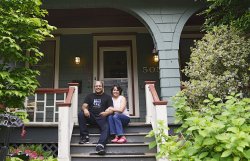Center for Cooperative Media Partnerships Engage New Jersey Voters
Dodge Foundation grant encourages political discourse with Voting Block project
Posted in: Communication and Media

In these politically divisive times, neighbors and friends are often reluctant to share their views with each other. As New Jersey’s fall gubernatorial election approaches, the Center for Cooperative Media at Montclair State University’s School of Communication and Media has received funding to spearhead a project that aims to encourage civil political dialogue and more informed voters in neighborhoods across the Garden State.
Voting Block, a collaborative reporting project on the gubernatorial race, launched on June 12. The Center for Cooperative Media, which is coordinating the editorial components of the project, has received a $15,000 grant from the Geraldine R. Dodge Foundation through its partnership with the John S. and James L. Knight Foundation. Initial Voting Block news partners include WNYC, WHYY, WBGO, NJ Spotlight and The Record/USA Today Network. The new grant will allow the Center to expand the project to another 12-15 hyperlocal news organizations around the state.
“We were looking for an election-related project that our local news partners could work together on,” recalls Center for Cooperative Media Director Stefanie Murray.
“It was Nancy Solomon, managing editor of New Jersey Public Radio at news partner WNYC who came up with the idea of following specific sets of voters and chronicling their reactions to and thoughts about issues throughout the months of the gubernatorial race”
According to Solomon, part of the mission of WNYC is to create conversation. “It’s not often I have an opportunity to combine reporting and storytelling about an election with the creation of those conversations,” she explains. “It’s a new approach to do it as part of a collaborative reporting project.”
To WNYC Enterprise Editor Patricia Willens, who is editing Solomon’s stories, Voting Block is especially important because it puts the spotlight on voters and the issues that concern them rather than on the candidates. “It also offers a real breadth and depth of voices across New Jersey,” she notes.
Murray expects Voting Block will ultimately include close to two dozen partners, who will all follow and report on close to 100 New Jersey residents leading up to the election. “We want diversity of opinion as well as geographical diversity,” she says. “By starting local, and building relationships between neighbors, we hope to cut through heated rhetoric and make a positive impact and a difference in the way we discuss politics.”
Partner New America Media, the nation’s largest coalition of ethnic media, and the California-based Reveal from the Center for Investigative Reporting have each also received funding for the project from the Dodge Foundation.
New America Media is working to represent New Jersey’s ethnic communities. “We will be posting stories on Voting Block partner sites from the Brazilian Times, the Asian Journal, the African Sun Times, Reporte Hispano, Zaman Amerika, and the Arab Media Network,” says New America Media writer and national media director Anthony Advincula.
The Center for Investigative Reporting is coordinating and facilitating audience engagement for the project. “They’re building a public guide on how to host constructive neighborhood conversations and plan to launch a statewide engagement campaign around Voting Block in early July,” Murray explains.
While each participating news organization covers a unique neighborhood, Solomon has recruited residents from Hillside Terrace, a diverse block that runs through both West Orange and South Orange. “So far, my initial reporting confirms my thesis that people don’t talk politics with neighbors they disagree with,” she says. “Ultimately, if not just the good people of Hillside Terrace, but all our listeners, were to come to a better understanding of where people on the other side of the political divide are coming from and why they believe what they do, I’d consider the project a success.”
“While New Jersey’s 2017 elections present a valuable opportunity to engage the public around issues that matter to them, it’s no small thing that local media from across the state are coming together to collaborate to tell the stories of the election through the lens of neighborhoods, especially during this time of concerning levels of trust in media, news literacy and news inequality,” says Meghan Jambor, Dodge’s interim informed communities program officer. “We look forward to reading the stories and seeing the creative ways partners will bring their reporting to life.”
